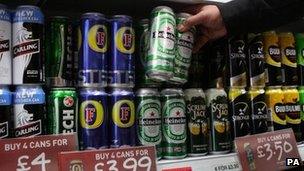Minimum alcohol pricing: Analysis
- Published

Plans for a minimum price for a unit of alcohol in Scotland have been announced.
A minimum price for alcohol based on strength is a radical health policy which is likely to attract attention from around the world.
Scotland is not the only country to have considered this step, but would be the first in the world to implement it in an area where alcohol is sold relatively freely.
A minimum price per unit of alcohol has the largest effect on the cheapest and strongest drinks which is why it has attracted a wide range of support from health campaigners.
The impact would be most visible in shops and supermarkets as that is where the discount selling is most widespread.
Those who support a minimum price say there is strong evidence internationally that price is linked to consumption, and higher consumption is linked to higher harm. They point to Finland where in 2004 a dramatic cut in prices via taxes led within a year to an increase of 9% in consumption, according to official figures.
Most alcohol in Finland is sold through tightly controlled government-run shops. By 2005 alcohol-related problems were the most common cause of death among Finns of working age.
In the UK health organisations say alcohol sold in shops has become steadily cheaper compared to incomes. Most tax increases by the Treasury have been absorbed by retailers rather than fully passed on to shoppers.
An analysis by the Institute for Fiscal Studies showed a widening gap, external between incomes and beer, wine and spirits sold in shops between 1990 and 2008.
Widely backed
Since the SNP first published outline plans for legislation to introduce a minimum price per unit the idea has won a broad coalition of support from health campaigners.
By 2008 academics at the University of Sheffield had produced modelling for the Department of Health in England of the impact of different levels of minimum price.
They suggested if it was set at a high enough level it could reduce the impact and cost of alcohol to society. The research was later strongly challenged by alcohol retailers and producers, who said the model was flawed.
Councils across the north-west of England have begun looking at whether they could introduce bylaws to enforce minimum pricing.
The local authorities in Greater Manchester are expected to consider a final draft within the next couple of months, with neighbouring councils in Lancashire, and Merseyside at varying stages in a similar process.
Even those who are opposed to minimum pricing per unit have accepted that too much cheap alcohol can be a bad thing.
England has introduced a minimum price of duty plus VAT, which health campaigners have described as a weaker measure, but which the coalition government said was designed to prevent below-cost selling.
Legal problems?
Last week Anne Milton, Public Health Minister for England, told MPs that a minimum price per unit of the kind being put forward in Scotland could be open to legal challenges. She warned it might fall foul of European competition law.
Legal challenges are quite likely, as minimum prices for tobacco on health grounds have been ruled unlawful by the European Court of Justice. The judges said taxes could however be used as a deterrent.
The European Commission has been less clear about alcohol. In 2009 it said minimum pricing had the potential to target heavy drinkers, rather than moderate drinkers. In order for minimum pricing to satisfy the law it would have to show it was in proportion to the problems caused by alcohol, without unduly restricting competition.
Less helpful for those making a case for this measure to be introduced in any part of the UK are some of the overall trends.
The overall consumption of alcohol has begun to dip slightly, external in recent years, after decades of a rising trend. There was a similar small fall in the number of alcohol-related deaths.
It is hard to know what is behind this slight recent shift, but it may be due to greater public awareness of the risks of drinking.
Some people may drink very little, but official statistics also suggest a significant minority drinking above recommended levels.
Whatever the models suggest, the real test of minimum pricing will be a sustained reduction in consumption, deaths and the overall cost of alcohol to society at a rate faster than these recent UK trends.
Special case
What will turn the world's eyes towards Scotland is the introduction of a minimum price per unit in an environment where alcohol is fairly freely sold. Unlike some of the states in Canada which have tried similar measures, there is no history in Scotland of prohibition or of selling alcohol through government-run shops.
However, the research modelling done in the UK has borrowed from the varied experience of price restrictions in various Canadian provinces.
There may be some unexpected support from bar and pub chains who have seen their profits under attack from supermarket deals. Wales and Northern Ireland may make sympathetic noises.
There will of course also be fierce opposition from retailers who feel their right to sell at a competitive price is under attack and from moderate drinkers who - rightly or wrongly - feel this is a blunt measure that will unfairly penalise them.
- Published1 November 2011
- Published1 November 2011
- Published1 November 2011